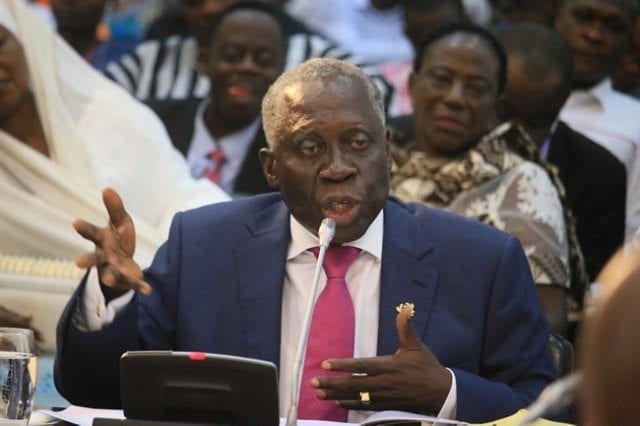Senior Presidential Advisor, Yaw Osafo-Maafo has recollected how some traditional authorities got furious with him for championing the idea of publishing assets during the National Consultative Assembly for the drafting of the 1992 Constitution.
He said the chiefs expressed concerns that they could be killed by their relatives if they got to know of the properties that they had hence their rejection of the idea of publishing the list of the properties as part of the asset declaration regime.
Addressing a forum on open government partnerships and construction sector transparency in Accra, on Tuesday, April 23, he said “I happened to be at the Consultative Assembly when we were drawing up the Constitution of the republic when they put in this phrase [Asset declaration]. I was championing the publication of the assets, the chiefs were there in the right numbers, and they were so furious with me, because they said ‘look, do you want people to kill us when they know what we have’?
“So because of our traditional system of inheritance where in the Akan world it is maternal inheritance, when I am dead, it is my brother first, after my brother my sisters. It is matrilineal, so if people know you have a lot of properties, they may kill you, so people are scared to openly let people know what they have.”
With the current asset declaration regime, Mr Osafo-Maafo observed that it is not transparent, a situation he said makes it difficult for one to challenge the declaration that has been done.
Publication of a load shedding timetable can only be done by Energy Minister – Osafo-Maafo
Under the current regime, he explained, the declared assets remain confidential between the Auditor-General and the officers declaring the assets.
He said “In Ghana when you become a minister of state, at all levels, asset declaring is the first thing you do, you declare your asset and file same at the Auditor General. What I personally don’t like about this law is that after you declare the assets everything is kept confidential between the Auditor-General and yourself.
“Therefore, it becomes very difficult for anybody to challenge the authenticity of your declaration.
“I think that yes, let us declare the assets but there should be a certain level of transparency in the declaration of the assets so that people assess what you declare.”
Asset declaration is a multifunctional anti-corruption tool aimed at detecting the acquisition of illegal and unjust enrichment and for recovery of same to the state and building broader integrity of public service.
The Public Office Holders Declaration of Assets and Disqualification ACT 1998 (Act 550) has been in existence for a very long time and has always been a feature of Ghana’s constitutional and legal framework since the 1969 Constitution down to the 1992 Constitution.
Article 286 (1) of the 1992 Constitution states that: “A person who holds a public office mentioned in clause (5) of this Article shall submit to the Auditor-General a written declaration of all property or assets owned by or liabilities owed by, him whether directly or indirectly


